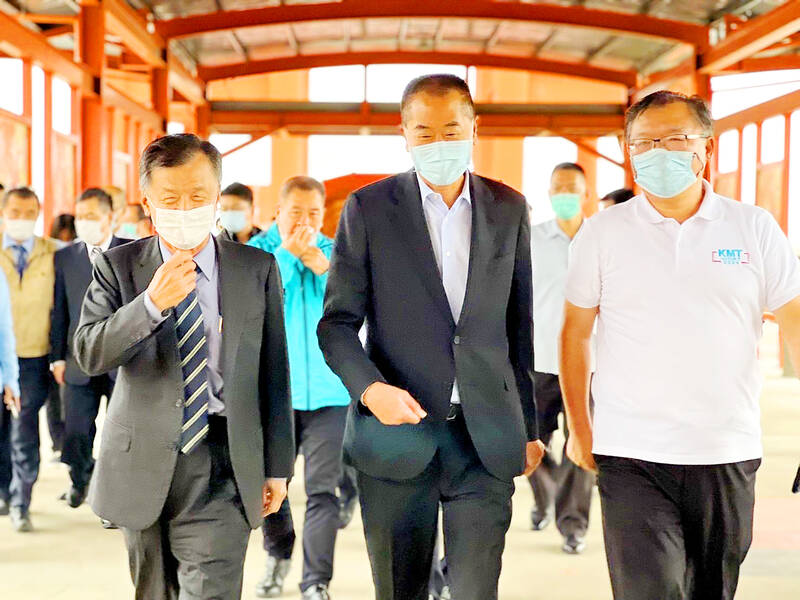Border policies are to be relaxed for certain travelers from China, Hong Kong and Macau from Monday next week, the Mainland Affairs Council (MAC) said yesterday.
As Taiwan’s COVID-19 situation is gradually being brought under control and the number of inbound travelers has remained below the weekly limit of 150,000, the nation’s borders would be further opened to people from the three destinations, the council said in a news release.
Chinese students would be allowed to enter Taiwan for short-term study and research programs, while people from Hong Kong and Macau would be allowed entry for work and religious purposes, and as part of tour groups, the council said.

Photo: Wu Cheng-ting, Taipei Times
Authorities would process Chinese students’ entry applications normally, as Taiwan reopened its borders on Oct. 13, it added.
Tour groups should apply through travel agencies approved by the Tourism Bureau, the council said, adding that each group can consist of five to 40 people and can stay in Taiwan for up to 15 days.
The council would continue to adjust the border policies for people from China, Hong Kong and Macau to strike a balance between economic development and disease prevention, it added.
The government on Sept. 29 allowed people from the three destinations to apply to visit Taiwan for humanitarian, family or business reasons.
Separately yesterday, the Central Epidemic Command Center (CECC) reported 29,922 new local COVID-19 cases and 55 imported ones, as well as 81 deaths.
It also reclassified 137 cases as moderate and 83 as severe, including two cases of multisystem inflammatory syndrome in children (MIS-C) involving a one-year-old girl and a 10-year-old boy.
The boy was discharged from hospital on Sunday after his condition improved, while the girl is still in an intensive care unit, said Centers for Disease Control Deputy Director-General Philip Lo (羅一鈞), deputy head of the CECC’s medical response division.
The girl was diagnosed with MIS-C 168 days after being diagnosed with COVID-19, marking the longest interval recorded in Taiwan, the CECC said.

LONG FLIGHT: The jets would be flown by US pilots, with Taiwanese copilots in the two-seat F-16D variant to help familiarize them with the aircraft, the source said The US is expected to fly 10 Lockheed Martin F-16C/D Block 70/72 jets to Taiwan over the coming months to fulfill a long-awaited order of 66 aircraft, a defense official said yesterday. Word that the first batch of the jets would be delivered soon was welcome news to Taiwan, which has become concerned about delays in the delivery of US arms amid rising military tensions with China. Speaking on condition of anonymity, the official said the initial tranche of the nation’s F-16s are rolling off assembly lines in the US and would be flown under their own power to Taiwan by way

OBJECTS AT SEA: Satellites with synthetic-aperture radar could aid in the detection of small Chinese boats attempting to illegally enter Taiwan, the space agency head said Taiwan aims to send the nation’s first low Earth orbit (LEO) satellite into space in 2027, while the first Formosat-8 and Formosat-9 spacecraft are to be launched in October and 2028 respectively, the National Science and Technology Council said yesterday. The council laid out its space development plan in a report reviewed by members of the legislature’s Education and Culture Committee. Six LEO satellites would be produced in the initial phase, with the first one, the B5G-1A, scheduled to be launched in 2027, the council said in the report. Regarding the second satellite, the B5G-1B, the government plans to work with private contractors

‘OF COURSE A COUNTRY’: The president outlined that Taiwan has all the necessary features of a nation, including citizens, land, government and sovereignty President William Lai (賴清德) discussed the meaning of “nation” during a speech in New Taipei City last night, emphasizing that Taiwan is a country as he condemned China’s misinterpretation of UN Resolution 2758. The speech was the first in a series of 10 that Lai is scheduled to give across Taiwan. It is the responsibility of Taiwanese citizens to stand united to defend their national sovereignty, democracy, liberty, way of life and the future of the next generation, Lai said. This is the most important legacy the people of this era could pass on to future generations, he said. Lai went on to discuss

MISSION: The Indo-Pacific region is ‘the priority theater,’ where the task of deterrence extends across the entire region, including Taiwan, the US Pacific Fleet commander said The US Navy’s “mission of deterrence” in the Indo-Pacific theater applies to Taiwan, Pacific Fleet Commander Admiral Stephen Koehler told the South China Sea Conference on Tuesday. The conference, organized by the Center for Strategic and International Studies (CSIS), is an international platform for senior officials and experts from countries with security interests in the region. “The Pacific Fleet’s mission is to deter aggression across the Western Pacific, together with our allies and partners, and to prevail in combat if necessary, Koehler said in the event’s keynote speech. “That mission of deterrence applies regionwide — including the South China Sea and Taiwan,” he